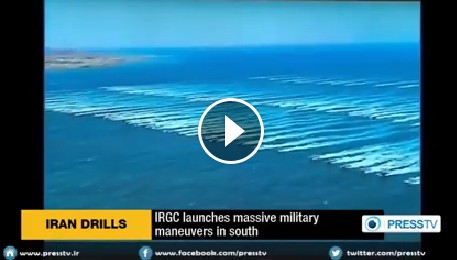
Iran’s Islamic Revolution Guards Corps has launched a massive military drill in the country’s south.
The Great Prophet Nine maneuvers are being held in the Persian Gulf and the Strait of Hormuz.
The first stage of the drills demonstrates naval drill tactics. Hundreds of I-R-G-C speed boats, equipped with missile launchers, have taken part in the drills. The assault boats conducted sea mining maneuvers. Four shore-to-sea cruise missiles were fired at mock enemy targets and a Nimitz-class aircraft carrier was targeted as part of the drills.
A number of high-ranking officials, including the Commander of Iran’s Islamic Revolution Guards Corps, were present at the site of the drills. Major General Mohammad Ali Jafari says the maneuvers aim to provide security for the region.







